#normative studies
Text
JUDGING CRITICAL THEORY, III
[Note: This posting is subject to further editing.]
An advocate of critical theory continues his/her presentation[1] …
This current series of postings is reporting on the basic elements of critical theory, the main antithetical view to the dominant natural rights view that Americans mostly favor when it comes to governmental/political thought. Critical theory is a view that focuses its concern on political qualities of domination and authority. Readers are invited to review the last two posting of this blog for how it, the blog, has introduced this construct.
Part of that reportage was describing how critical theory grew out of the efforts of a multidisciplinary group of scholars who established the Frankfurt Institute. Their initial efforts, due to German politics during the 1930s, found these scholars moving the Institute eventually to New York City. After the ensuing years in which World War II transpired plus some stabilizing years, the Institute moved back to Frankfurt, Germany.
Changing its name once again – to the Frankfurt School – they were able to skillfully advocate their political positions and garnered a good degree of influence in a conservative West Germany. With this re-establishment in their original location, this group during the 1950s and ’60s aimed most of its efforts at attacking positivism. That is, these scholars found a good deal of fault with the trend among the social sciences to adopt more rigorous scientific protocols in conducting their studies.
This specifically meant that social sciences – which relied heavily, up to that time, on more narrative/historical forms of research – focused on hypothesis testing methods in which observations of human behaviors were measured to discover significant correlations between independent and dependent variables. This was deemed to be a major obstruction to the School’s main aim, i.e., to change society.
Why? Because the behavioral approach objectified the study of politics while the Frankfurt group’s change-oriented aim relied heavily on normative questions – change presupposes value determinations. And adding fuel to this disaffection of the prevalent social sciences was, at that time, a highly emotional development, that being the student anti-war movement – mostly a reaction to the Vietnam War – that both Europe and the US was experiencing.
The resulting disruptions between those in power and anti-war demonstrators with allies like leftists from the Frankfurt School, grew and featured concerns over the various forms of subjugation the School was highlighting which mostly affected either low-income groups or targeted groups of prejudicial policies or both. And this fed into the School’s concern with social science modes of research.
The “establishment” – made of those who belonged to privileged groups – was adopting behavioral approaches in their analyses of social realities and they stood in support, for the most part, with the war footing against Communism. Partly due to World War II lessons – appeasing aggression from “foreign” invaders – and capitalist aims to expand their markets across the world, there seemed to be tunnel vision among the power centers as to what appropriate policy should be adopted concerning such developments as those being witnessed in Southeast Asia.
The School found itself, again, in an uncomfortable domestic environment in Germany due to the disruptions associated with the anti-war movement. At that time, though, new blood was making its way into the School’s ranks. One such newcomer was Jurgen Habermas, who introduced a very influential communication theory.
That theory points out the necessity for participating actors of various social arrangements – whether they be federated (in agreement) or antagonistic – to recognize the intersubjective validity among their claims so that social cooperation can be achieved.[2] This is veering critical thought further from pure Marxist thinking (a trend pointed out in previous posting), albeit not in contradiction to it.
Was there a complete divorce between Marxists and critical theorists by what critical theorists were promulgating through the School or other platforms? One area that these critical scholars seem to have maintained a strong link with Marxist thinking was their rejection of purely objectified social science research.
And by transcending the boundaries among the various social sciences – becoming highly interdisciplinary – and other related disciplines (such as linguistic or aesthetic studies), these writers started to find fault with segregating these objectified studies from normative political theory as indicated above.
In so doing, they fell squarely with Marx and his views that it is essential to keep social science protocols (of either historical or behavioral-based types) and social criticism relatable to each other. The former provides the means, but the latter keeps such efforts along justifiable rationales which, in turn, help those involved in exerting the energy and expending the resources such research demands.
Despite this link, Marxist scholars, for their part, found it offensive that critical theorists would be disposed to seemly leave behind Marxist focus on proletarian revolution and the energetic adoption of going into other non-Marxist sources of scholarship to inform the substance of their research and writings.
But, as time passed, this separation of research such as between positivist studies (based on factual information) and normative studies (based on values), lost its fervor and has come to be seen today as artificial. The concern eventually fell from overall academic importance. In that, critical theorist played an important role.
And as critical theory further developed, certain inconsistencies have materialized among those affected scholars. The next posting will delve into these inconsistencies and report on how they, ironically, further diversified the interests of those who claim to be critical theorists or exponents of this construct. Many a movement was generated or overwise inspired by critical theory and its advocates.
[1] These postings that convey the basic information regarding critical theory heavily depends on the overview provided by William Outhwaite. See William Outhwaite, “Critical Theory,” in The Blackwell Encyclopedia of Political Thought, edited by David Miller, Janet Coleman, William Connolly, and Alan Ryan (Cambridge, MA: Blackwell Publishers, Ltd), 106-109.
[2] For interested readers in this generalization, see “Jurgen Habermas,” Stanford Encyclopedia of Philosophy (2007/2014), accessed March 18, 2023, https://plato.stanford.edu/entries/habermas/#:~:text=Habermas's%20theory%20of%20communicative%20action,on%20which%20social%20cooperation%20depends. It is beyond the purposes here to delineate Habermas’ argument at this point.
#critical theory#positivist studies#Vietnam War#normative studies#Marxism#civics education#social studies
0 notes
Text
this is by no means comprehensive, as this app has a skewed demographic to begin with, but I'm just trying to decide on whether this is a worthwhile topic for the women and gender studies project I'm doing.
#im sorry i know this is so not dyslexia friendly but i didn't know how else to word it#science side of tumblr#queer#queer community#double minority#adhd#audhd#autism#lgbt#lgbtq#lgbtqia#lgbtq community#neurodivergent#actually neurodiverse#neurodiversity#gender studies#fuck gender norms#queer pride#trans#transgender#poll#tumblr polls
2K notes
·
View notes
Text
hazbin hotel is tricky with religious stuff because it's a universe that plays fast and loose with a heavily modified version of christianity that is Real and True, so it doesn't really attempt to tackle or address other religions—which i think is totally fair, because it would be too difficult to reconcile that sort of thing with the worldbuilding while ensuring the premise stays coherent. still, i would be curious about how different religious folks try to reconcile going to hell in the hazbin universe because it's an interesting thought experiment. what would you do if you went to another religion's hell, but it isn't even exactly how they believed it was going to be? i actually think there's a lot of flexibility in hazbin's strategic avoidance of mentioning g-d (and the heavy editing of the eden story) because it leaves some wiggle room for the possibility of accommodating the reality of this particular iteration of hell into different theological systems without betraying one's core beliefs
#still thinking abt observant jewish rosie in this context#the religious studies major in me is soooo interested in the way hazbin approaches religion#it's all very christian-normative of course but it subverts enough of christianity to actually leave a LOT of room for other religious#systems to synthesize various theological frameworks#hazbin hotel#hazbin hotel meta
88 notes
·
View notes
Text
Normal Oak…. an author to me
#until proven otherwise lol#I know Norm wanted to be a therapist if not a mascot but yknow#I think he went to college for psych but got way more invested in literature and creative writing#i know he’d have an insane series it’s real to me lmao#normal oak swallows garcia#normal oak#I also think he did use his brief psych studies to absolutely tear an ex to shreds during a vent session with his spouses#that’s also real to me idk why
98 notes
·
View notes
Text
platonic and romantic are not some sort of binary that relationships have to be divided into. they’re not even two ends of a linear spectrum. they’re fully just abstract concepts made up of culturally-dependant social behaviour and expectations that are continually forced upon people to reinforce religious, legal, and broader societal/cultural norms, often and repeatedly to the detriment of non-normative groups including, but not limited to, the queer community. and I am sick and tired of those norms being replicated in fucking fandom discourse, of all places
#this is coming from an aroace person#who is not only v autistic which is undoubtedly a contributing factor to this#but I also literally study queerness for a living#idk I saw a post trying to put some superiority onto emphasising platonic relationships over romantic ones#and that’s great!#it definitely counteracts the alloromantic norm!#but god I wish we could move past the concepts entirely#I understand all abstract terms and what have you are literally there to communicate these things#but idk idk#as someone who has to navigate this bs every time I have a close relationship with a non-relative I’m so tired of it#like even in self defined qprs sometimes romance and sex happen!!!! that does not mean it isn’t a qpr/ isn’t platonic !!!!!#why is it if you’re best friends with your romantic partner you have to refer to them using the romantic terms of not alloromanticism#on the same vein expecting aromantic ppl to never want or enjoy any acts or behaviour called “romantic is such bs#like what is romance ? what actions are romantic that cannot also be platonic?#why differentiate relationships so strictly if not for religious/legal/etc regulations and norms#is this perspective called something#there’s no way I’m the only person to have this pov#like is this relationship anarchy ? idek if that’s a term but it’s what comes to mind#aromantism#aroace#aro pride#arospec#qpr#qpr concepts#relationship anarchy
27 notes
·
View notes
Text

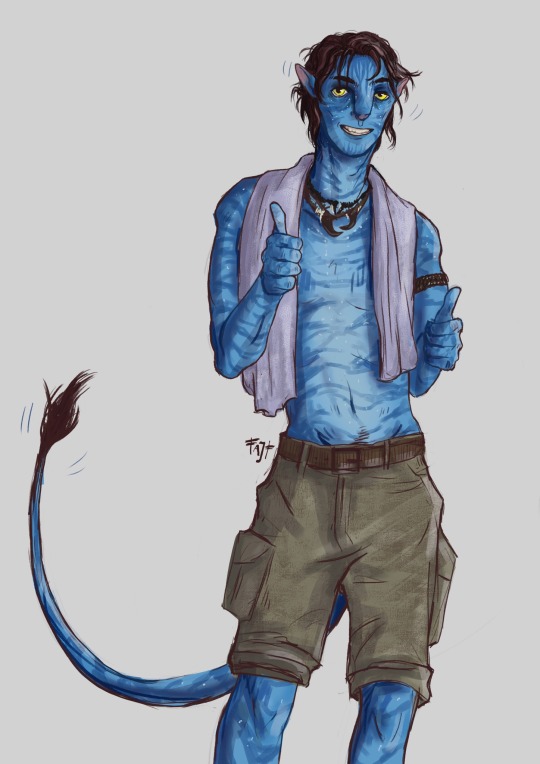

I fucking love Norm.
#avatar twow#avatar#avatar 2#avatar 2022#avatar : the way of water#norm spellman#norm avatar#he deserves the world#light study#my artwork#fan art
1K notes
·
View notes
Note
HOLD ON HOLD ON YOU WETE THE ONE WHO DREW VANITAS IN THE BLUE DRESS WITH THE STARS?? THE ONE FOR THAT FANFIC WHERE VANITAS DISGUISED HIMSELF AND OMG ITS DELICIOUS 5 STAR MEAL✨️

YES I DID DRAW THAT 😮💨😀
it was such an honor draw that piece for laced up corsets! 💜
#thanks for the ask!#ask calli#I cant believe you remember that#that was like a year ago#must’ve really stuck in your memory#I feel so honored#enjoy more fem Vanitas#he is so pretty#so gender#he breaks the social norms#look at him twirl#vanitas no carte#the case study of vanitas#vnc#fanart#doodles#anime#vanitas#manga#vanoé#les mémoires de vanitas#this is based off a fanfic#ao3
43 notes
·
View notes
Text

I'm glad Bendy is slowly — but surely — growing out of his hyper-protective and thus demanding personality traits; I'm happy to see that Bendy wants to keep on doing better, and not only does he do his best to be better than he was acting before, but understands that it's hard, it's always gonna be hard but still keeps pushing. He doesn't let the difficulty of the situation topple him
He is doing his best, and I'm immensely proud of him
#sometimes if you want someone to do better you HAVE to praise their best efforts#bc what's easy and just the bare minimum to you can be YEARS of improvement for somebody else#what seems like a no-brainer to you — you who has been raised in that environment and has studied it and has been affected negatively by it#what seems like the norm — that which is your day-to-day. your routine. what you breathe and exhale. the sun taht rises and dips in the far#that which you deem common might just NOT BE for others#sometimes you DO have to compliment people on their best attepts at stuff. EVEN if you think it's “common sense” or “bare minimum effort”#bc for that person it MAY NOT BE#and like with most things involving human beings: you may be battling for something good and important-#-yet if you keep pushing others away the other side WILL welcome them. and YOUR rejection WILL BE that other side's ammo AGAINST YOU#anyway tag rant over don't mind me#I've just had that thought in my mind for a while#bendy was the excuse to say it lol#anyway#demon rambles™#inky mystery#bendy and boris in the inky mystery#babitim#the inky mystery#inky mystery bendy#quest bendy#reading#live reading#live read#live blogging#liveblogging#fanfiction#fanfic#ao3 fanfic#ao3#reading fanfiction
26 notes
·
View notes
Text
when old literature and opera describes good-looking men as "so pretty as to be confused for a girl" in a completely complimentary way... why did we lose that
#[.txt]#that is a rethorical question the answer is literally the French Revolution @#and I am fully serious in saying that by the way you have no idea what studying the gender norms pre-1780s did to me
154 notes
·
View notes
Text
I've been thinking about the screwed magnetic fields of the grand line recently, and while that train of thought didn't lead anywhere, the phrase I liked - "an invisible birdcage" - really applied to Sabo's situation nicely.
I mean, it's obvious how much influence Sabo's parents have on him, but have you ever thought that Sabo never felt freedom while he was staying in Goa kingdom? And it's even before he was brought back to his family and properly realized just how messed up nobles are!
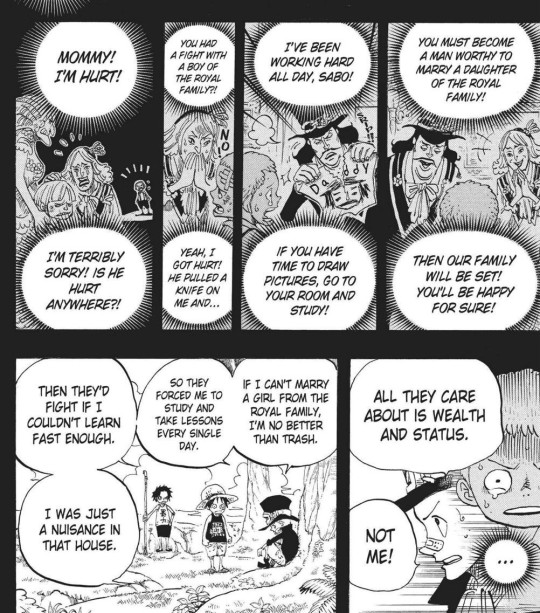
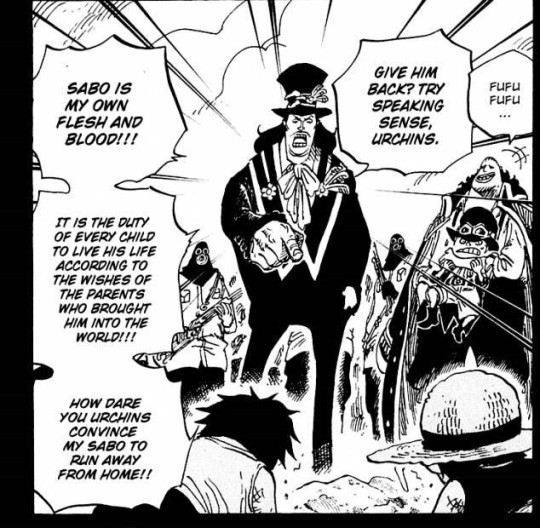
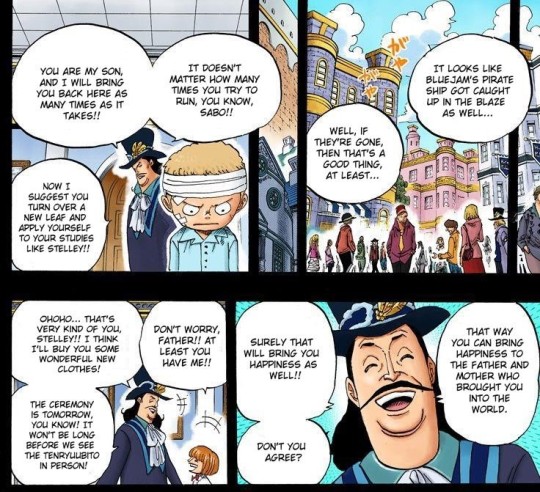
We've seen multiple times that his parents treat him as something they own, that he unquestionably belongs to them, and even after running away to the Gray Terminal the feeling of being tied down never went away. It seems like Sabo internalised that so much, that he didn't even realise that he was free this whole time! He was free to choose his future, he was free to choose his family! The only thing holding them down was that they were unprepared to set sail,amd even then they could always leave if they wanted! As Sabo did - by stealing the boat.
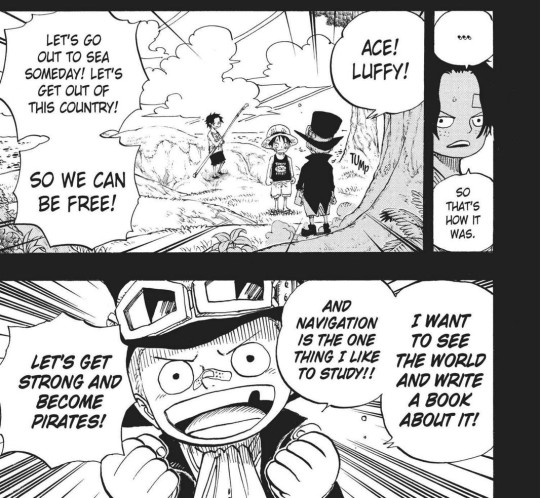
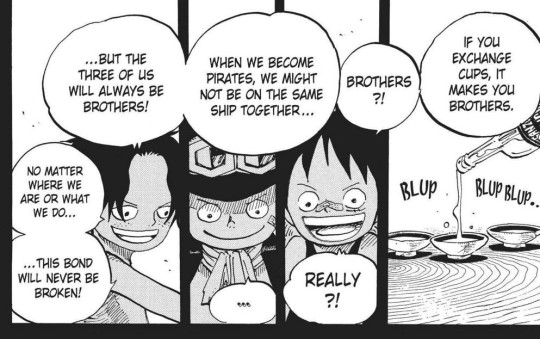
And yet he still longed for freedom, to be "anywhere but here". We can see it in his design - he lives among the 'scum' of the Gray Terminal, and yet he still dressed as a noble, he wears a waistcoat and a top hat which reminds us of the fashion of the high town and especially his father, and his cravat is tied tightly around his neck. His life really was suffocating for him. Even if he was physically away from his family he still could feel their influence, though he was outside the city wall, outside of their reach! And he ran away 5 years ago! He's spent so much time living there, that his noble upbringing has faded - he felt compassion towards the people of the gray terminal, which nobles don't even consider human; he even put someone else's happiness before his own - which is unheard of in the noble circles; he has defeated men twice his size, fearlessly charged into battle while nobles don't want to get their hands dirty. And yet he was powerless when met with violence from his father, showing that despite all this time, despite how much he's changed he still was in that invisible birdcage, unable to act under the influence of his father. (which is why he leaves again)
Even Ace and Luffy feel that:
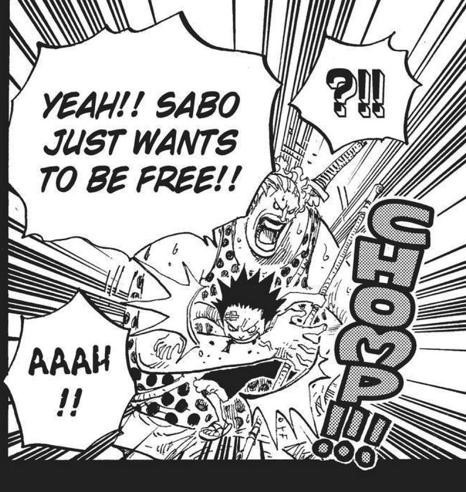
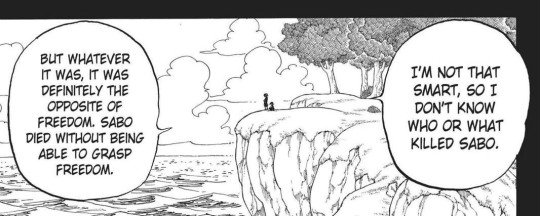
And it's really sad that Ace says that Sabo was never able to grasp freedom, because even if briefly, he did. With you two :") But he could never feel freedom as long as he stayed in the country where people are treated no better than trash, and the shadow of his family and Goa's walls lingered above him.

And a couple of hundred chapters later we see the extent of his parents' grasp! Even with amnesia this deep-seated feeling of confinement never left him. (Though I do think that it's not just the abuse from his parents but also his disgust with nobles as a whole: the burning of the Gray Terminal and nobles' indifference to it clearly affected him a lot)
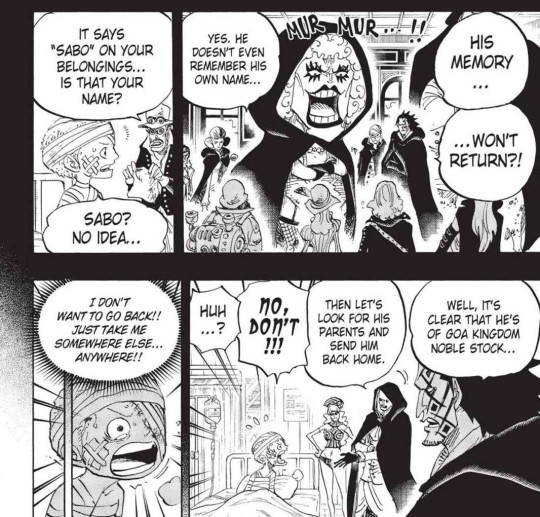
And what's worse, now he can't even identify what's wrong! I mean, it's clear that his parents were abusive, you don't need to be a Sherlock to figure that out, but the specific details are lost. Think about it! He ended up on a ship with people who at first didn't really want anything to do with him - not out of malice, they just have more important things at the moment; and then in an organisation(an army) where your value as a soldier is based on your performance(like rising through ranks and such). He doesn't know that his parents equated his worth with his usefulness, and the revs don't know that the boy being so eager to help isn't just a rightheous motivation. He needed to be sure that their efforts on getting him to health weren't in waste, to be useful, so that the only people he knows won't just leave him, plus pair it with his moral values, distaste of nobles, longing for freedom... – no wonder he is the second-in-command of the entire army by the age 22!
This guy's love language is acts of service, but no one (not even Sabo himself) realises that it stems from his screwed upbringing and fear of being cast away if he's not of use.


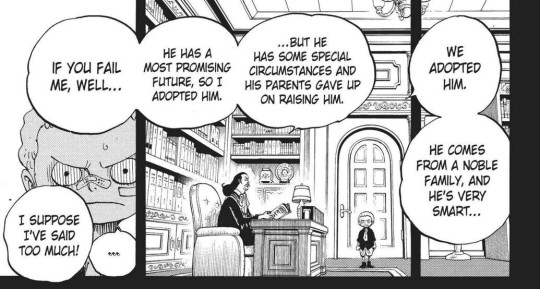
Ok, to be fair, it's mostly based on the flashbacks - I haven't finished my reread to look in depth at him as an adult yet! After all we've only seen point A(his childhood) and point B(adulthood) with the journey between them obscured. He does seem to be faring well tho! He takes his job seriously when needed, but also fucks around when he wants to - even if ppl around him show displeasure with that! Good for him.
Same with Koala actually! It's so nice to see her being able to express her feelings so visibly! Be it positive or negative. And I think it's cute, that while Sabo is both the common reason and victim of her outbursts of emotion, he never berates her for it! He's not thrilled, but he's not complaining either!
#all roads lead to Rome and all thoughts lead to Sabo so to speak#sabo#revolutionary sabo#one piece#karyss' rambling#oh now that I think Sabo and Koala share some parallels in their character development#the main one - they were forced to conform to extreme extent of societal norms: reserved emotions. tidiness#obedience. studies for future. living up to parents' expectations etc...#and by healing from that they both grew up insufferable to be around🫡
19 notes
·
View notes
Text
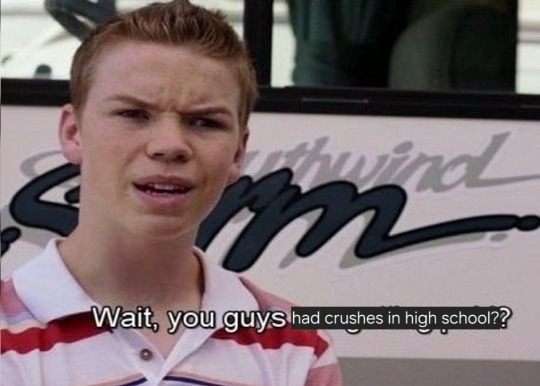
#this is SUCH a joke btw I know having crushes in high school is like. a deeply normative experience#the more accurate meme would be me posting the 'your experiences are not universal' meme @ myself#'my experiences' being......#idk I don't consider what I had crushes. I simply wanted to study them like a bug then made them my best friend + demand all their attention
19 notes
·
View notes
Text
it's called gousotsu because it's the reverse of sotsugyo - 'graduating' into adulthood - and the entire show is about satoko's attempt to escape this graduation by retreating back to the safety of childhood and how she's regressed in her attempt to heal from trauma.
#it's such an important framework for engaging with satoko's relationship with rika and her motives as a culprit#her special relationship with rika that didn't need to be defined when they were children#is no longer considered okay by st. lucia and society at large because they're no longer innocent children#st. lucia is where they’re expected to care about societal norms and standards#such as prioritizing their studies and upholding the image of 'proper young woman' that the school promotes#as well as the approval of their peers and satoko is someone incapable of conforming#their relationship would be thought of as weird at best and wildly inappropriate at worst if they continued it as they've been doing#it's why rika's friends act like satoko did something appalling when she so much as hugs rika#this is why st. lucia also has huge class s vibes#gamo.txt
45 notes
·
View notes
Text
becoming disillusioned w/ higher education the second i left was so. okay a few years ago i sat in on a panel with 2nd gen south asian professionals (cause my friend was on it and we were hanging out after) geared towards brown high school kids looking to get into college. and everyone on the panel was pretty successful and had Done The Right Thing in hs and while there were a few liberal arts jobs up there it was mostly stem/business. but every single panelist refused to stick with the narrative they were supposed to stick with and every single one of them was like yeah i regret how I treated myself in high school and i regret assuming that if I can do well academically I'd be an ok person in the end. but during the q&a portion these 16 yr olds would raise their hand like "hi so how would I go about getting an internship in this very specific biomedical field that you were in" and the panelists had to be like "look. you aren't listening. if you keep doing this you are going to burn out so spectacularly that you will barely recover. the takeaway message is that none of this matters more than You" of course im sitting there like 😶 (cause that did in fact happen to me when i was 20 and im lucky i recovered) but the fact that every single person who was right there with me in high school has to spend their twenties like why did i do that. what was that all for. what did it get me. and there are no answers
#why did i self study all those AP classes why did i take the SATs 8 times (min. since i was 12) why did i push my arangetram a year early#so it could be included on my college apps.#i have theories i think immigrant parents get their info on how to be successful from like tv and vague secondhand stories#and they think that's how it should be/the norm instead of a fictionalized success story. so we all had to do that#the prep classes and the flash cards and the extracurriculars and then you get to college and it's like NONE of it mattered#the moderator was so funny though he was older and did not expect any of them to say that
13 notes
·
View notes
Text
people saying that it's ridiculous for sonadow fans to be "eating good" from the sonic prime ep bc most of the ep was them beating up e/o just don't get it. where do you think the appeal is coming from ?
#also there r many sonadow fans who basically use sonadow as a character study for both (me)#i saw someone describe their liking into sonadow that way and i had to rob it bc it's so real#like too real#these charas bring out sm out of each other and it's so fun#we aren't looking for explicitly romantic scenes—otherwise ships like sonally and sonamy are there— the characters r very aro to begin w#i feel like it's bc based of their very baseline understanding of love (and therefore baseline understanding of romantic love) they just use#that to say 'hey you're actually not winning' but we r actually#the appeal is that they r very aro and they r rivals and they fight and they make up and they're cool and have i said they're aro yet#sonadow was what made me come to terms w the fact i just might be aromantic lmao#like it's super cool. anyways when it came to sonadow it never was about the kind of love most know— afterall sonic and shadow r charas out#of the norm why should their 'romance' be anywhere near normal?#hnnnn they give me the brainworms NOBODY ELSE GETS ME#jk no there r but it's such a small percentage i'm crying#sth#sonic prime#sonadow#sonic the hedgehog#shadow the hedgehog
117 notes
·
View notes
Text
i get so mad when ppl say riddle would be ignorant/clueless towards lgbtq+ stuff bc he was raised sheltered. no the fuck he wouldn't. maybe he'd start out that way yeah but as Soon as its implied he doesn't know something hes taking that shit to heart and learning everything he could EVER know about it. hes making a fucking study of it. he knows more than you actually
#twst#txt post#jamie talks#idk maybe this is a delusional take#also shes transfem so jot that down#it just makes me really mad when ppl characterizing riddle as just Not Getting it#''he put she/her pronouns in his magicam bio because he thought he was supposed to put the prns of the gender he was attracted to''#FIRST OF ALL. THAT'S FUCKING STUPID.#sorry that was a real take i saw on tiktok it made me so mad#anyways riddle literally hates not knowing things and will study relentlessly until he's mastered it#see book 6 gamer riddle + halloween vignette riddle learning how to walk in high heels#and he's not going to disrespect others' identities just because they don't match the norm. what the fuck are you on#in his dorm vignette he was able to process that caters way of retaining information was different from his#and what did he do in response? learned. adapted his approach in order to reach cater in a way the other would understand#it's not so hard to believe that he'd do the same for sexuality+gender identity#anyways im crazy. riddle and her mandatory heartslabyul pronoun pins
81 notes
·
View notes
Note
Question— if gender is a social construct, then how does body/sex dysphoria exist, especially stuff like phantom limb that many trans people get?/gen. Although I guess I’ll never know, I think that if I spent my whole life on a deserted island and never had any human contact I’d still feel something off about my body and stuff. Like, having more or less pieces of paper doesn’t actually affect you, it’s the value that you put on those pieces that make money important, but I don’t think that’s how gd operates?
People (correctly) call gender a social construct because, like money, it's a concept that humans made up and have developed over thousands of years.
Societal standards about gender (AKA gender roles) dictate how people think about gender, and those standards are very cisnormative. The normal value and qualities given to gender by societal standards don't leave room for trans, nonbinary, intersex, and gender non-conforming people. For example in Western society the traditional thinking goes: long hair=boobs=feminine=woman and beard=no boobs=masculine=man etc even if that's not true.
So body dysphoria can exist because the social construct of gender says that certain body parts or features 'belong' to certain genders, and so anyone that doesn't fit that can experience dysphoria.
For example, a transfem who's spent her whole life growing up in a society that thinks p*nis=man is probably going to have bottom dysphoria (especially if she was assigned male at birth because of her genitalia).
And for your example of the island, trans and intersex people who live in more accepting places (with cultures that recognize gender diversity or that that don't equate gender with body parts) might be less dysphoric. Trans people who live alone may also be less dysphoric because they aren't being judged based on their bodies. That being said when the average person is cis and your body doesn't function/look the same way as theirs it can still make you feel dysphoric or weird about your body!
So if you lived on an deserted island there's no way to know if you'd still have body dysphoria if you'd never had any human contact but chances are that even if you felt off/weird, you wouldn't even have a sense of gender. The sense of weirdness is still valid but your no-human-contact self probably wouldn't be able to understand it.
The way people experience their dysphoria, just like the way people think about gender roles or value money or perform social customs etc, is very much influenced by their culture.
And so people with no/low dysphoria often just don't care as much about the traditional construct of gender. They know their body parts don't control their gender no matter what people say and it doesn't bother them that much. For people who do experience body dysphoria though, even if you know that body parts don't equal gender they can still bother you a lot (especially if people have invalidated you [or you've invalidated yourself] based on them).
Hopefully mod understood your question and this helps anon! Dysphoria is different for everyone and it's a tricky question.
#so yes a lot of this boils down to the fact that gender is a social construct but also cisnormative#and if you don't fit the norm and you know that then it can cause weird/bad feelings#dysphoria tw#gender dysphoria#dysphoria#not dysphoric culture#ask#mod answers#gender#gender studies#body dysphoria#sex dysphoria#cisnormativity#transphobia tw#internalized transphobia tw#tw genitalia mention#trans#lgbt+#queer#nonbinary#intersex#long post
62 notes
·
View notes